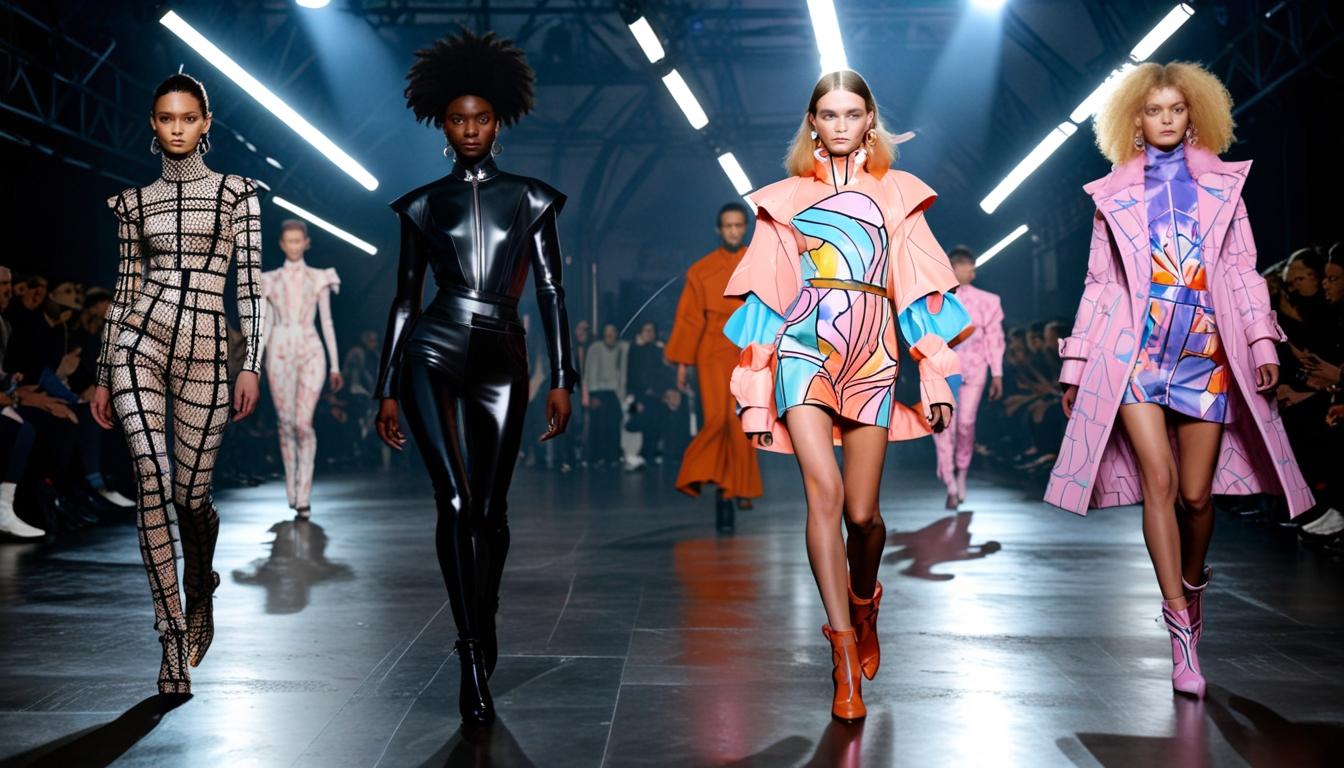You might say DKNY emerged from the vibrant tapestry of New York City, where designer Donna Karan sought to create something fresh in 1989. This brand wasn't just a label; it was Karan's vision of making stylish, accessible fashion for a younger audience. As you explore its origins, consider how DKNY's focus on casual, sporty aesthetics not only resonated with its consumers but also transformed the fashion landscape. The journey of DKNY raises questions about its impact and expansion—what drove its rapid success?
Origins of DKNY

DKNY, founded in 1989 by designer Donna Karan, emerged as a vibrant reflection of New York City's dynamic spirit. Karan envisioned DKNY as a fashion-forward diffusion line that would resonate with a younger audience. By focusing on casual styles and sporty vibes, she aimed to capture the essence of urban life, making fashion accessible and stylish for everyone. Initially, the brand spotlighted jeans and contemporary aesthetics, appealing to those who craved comfort without sacrificing style.
As DKNY quickly gained traction, it transformed into a global lifestyle brand, expanding its offerings to include menswear and children's clothing. This evolution showcases Karan's understanding of the diverse needs of modern families while maintaining the brand's signature New York City flair. The DKNY label reflects the unpredictability of city life, embodying a spirit that's both energetic and adaptable.
Karan's launch of DKNY marked a significant milestone in her career, following the success of her original line, Donna Karan New York, established in 1984. By creating DKNY, she not only broadened her design repertoire but also redefined contemporary fashion for an audience enthusiastic for versatility and style.
With each collection, DKNY continues to champion the chic, urban lifestyle that Karan envisioned, ensuring that both men and children can enjoy the same fashionable freedom. This commitment to inclusivity and modernity makes DKNY a beloved staple in the wardrobes of those who appreciate the unique blend of spontaneity and sophistication that New York City embodies.
Donna Karan's Vision
Donna Karan's vision for her brand encapsulated the vibrant energy of city life, blending culture and confidence into every piece.
With DKNY, Karan sought to create modern, versatile clothing that resonated with the dynamic lifestyles of urban women, inspired by the essence of New York City. She envisioned a fashion line that mirrored the spirit of New York City, capturing its unpredictability while catering to the everyday woman's needs.
Her aim was to make stylish clothing accessible to a younger audience without compromising on quality or design. This approach not only led to the brand's initial success but also to the development of iconic collections such as the Seven Easy Pieces, which became fundamental in establishing DKNY's identity.
Karan's philosophy for DKNY revolved around several key principles:
- Modern Design: Emphasizing contemporary aesthetics that align with current trends.
- Versatile Clothing: Offering pieces that can shift seamlessly from day to night.
- Urban Lifestyle: Reflecting the fast-paced, multifaceted nature of city living.
- Casual Sophistication: Focusing on sporty aesthetics, particularly in jeans, to create a relaxed yet refined wardrobe.
Launch of the Brand

In 1989, a new fashion label burst onto the scene, capturing the vibrant essence of New York City. DKNY, founded by the visionary designer Donna Karan, emerged as a diffusion line of her main label, Donna Karan New York. With an eye on the youthful audience, DKNY aimed to encapsulate the unpredictable energy and attitude of urban life through contemporary styles. The initial focus was on jeans and sporty aesthetics, making the brand relatable and appealing to a younger demographic.
As DKNY launched, it quickly transformed into a global lifestyle label, representing not just fashion but the entire New York experience. The brand's offerings expanded rapidly, moving beyond apparel to include stylish accessories and home goods, allowing it to cater to the diverse needs of modern women. This versatility made DKNY a go-to choice for those seeking a blend of practicality and style.
The excitement surrounding DKNY's launch set the stage for its growth, leading to a significant milestone—the 25th anniversary celebrated in Spring/Summer 2014. This occasion not only marked years of successful fashion innovation but also highlighted DKNY's enduring impact on the industry.
Through every collection, the brand continued to resonate with a global audience, proving that the spirit of New York could be worn and embraced by anyone, anywhere. The launch of DKNY wasn't just the birth of a brand; it was the start of a movement that redefined modern fashion.
Early Success and Expansion
Following the launch that captivated fashion enthusiasts, DKNY quickly found its footing in the competitive market. As a diffusion line of the renowned Donna Karan brand, DKNY was tailor-made to embody the vibrant energy and attitude of New York City.
With its initial focus on jeans and sporty aesthetics, it resonated with a younger demographic keen for modern urban wear.
DKNY's success didn't stop at jeans; the brand expanded its offerings considerably, creating a diverse portfolio that appealed to various consumers.
Here are some key milestones in its early expansion:
- Launch of DKNY Jeans in 1991, which solidified its presence in casual wear.
- Introduction of menswear that broadened its appeal beyond women's fashion.
- Children's lines that catered to families, showcasing DKNY's versatility.
- Diverse product range, including accessories and home goods, establishing it as a global lifestyle brand.
Influence on Fashion Industry

DKNY's impact on the fashion industry is undeniable, reshaping how urban women view style and practicality. Founded by Donna Karan in 1989, the brand captured the vibrant energy of New York City, targeting a younger audience with its contemporary designs. By emphasizing utility and comfort, DKNY revolutionized casual wear, making it not just functional but also fashionable. This approach helped urban women feel confident and stylish in their daily lives.
One of DKNY's most significant contributions is the concept of accessible luxury. The brand made high-quality fashion available to a broader demographic, breaking down the barriers that often separated high fashion from everyday wear. This shift set a new precedent in the industry, encouraging other designers to contemplate how they could make their offerings more inclusive.
Moreover, DKNY's commitment to modernity and versatility popularized the idea of capsule wardrobes. This concept transformed how women approach daily dressing, allowing them to curate a collection of interchangeable pieces that reflect their personal style while simplifying their choices.
As DKNY expanded globally, it played a pivotal role in solidifying New York as a fashion capital. This recognition inspired countless future designers and brands worldwide to explore their creativity and embrace the spirit of urban chic.




